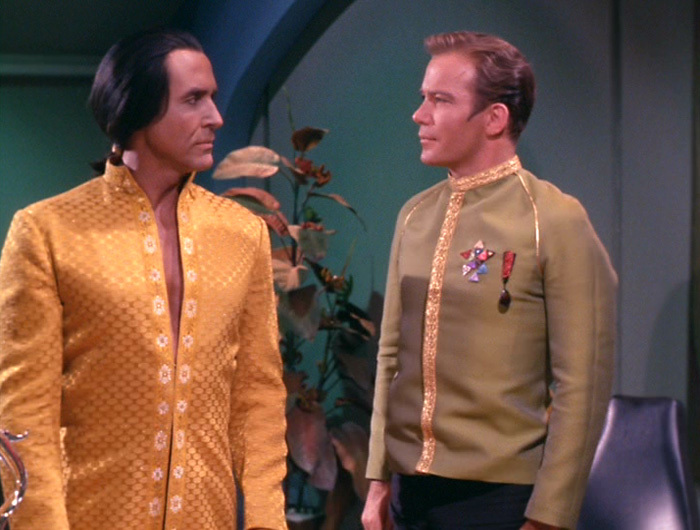On Saturday I did something I never do and watched five hours of Star Trek television and movies. I told you that I wanted to revisit old favorites and not feel pressured to only watch things that are new to me, and this was a fine start. Though perhaps in the future some moderation might be wise. Or logical.
After coffee, devotions, journal, and a long outdoor walk, I started the episode “Space Seed.”
If you haven’t seen it, or it’s been awhile, here’s a summary: while on a routine patrol, the crew of the USS Enterprise comes across a mysterious vessel. Beaming aboard, the away team realizes that the tech is from the 1990’s, but rather than Tamagotchi pets they find humans in stasis. These people seem to be genetically near-perfect, and the first one to awake is Khan.
KHHHHAANNNN! (No, that comes much later. Settle down).
But he’s not reviving easily and they nearly lose him. Lt. Marla McGivers is immediately smitten with Khan, just looking at him, and pleads with Bones to do something. In the 23rd century men are still men and women are recognizable and defined. Anyway, they bring Khan aboard the Enterprise, and if not for his amazing genetics he wouldn’t have survived. From his attitude and questions we can immediately tell that he’s up to no good.
Kirk, of course, is way too trusting. “Sure, take a look at the ship’s manuel. We have no secrets.”
Before you know it, Bones has woken up the other 72 survivors and everyone is debating philosophy before the fistfighting starts. Because this is Star Trek, people. That’s how we do it. McGivers finds Khan even more charming when he’s awake and he manipulates her into helping with a mutiny. Khan was a warlord in his time, and he’s not going to stop now.
But let’s get into the complexities of the episode. What are the writers showing and telling us?
Keep in mind, those who wrote the teleplay, Gene L. Coon, Carey Wilber, and Gene Roddenberry, remembered World War II. Roddenberry himself flew 89 combat missions. He knew how dictators thought and came to power, and how well that worked out for the freedom-loving everyman. He understood human nature better than the schoolroom-to-writers’-room grads working in Hollywood today. Real world experience outside of the theoretical will change a man.
Consider this exchange.
Captain James T. Kirk: [looking at a library picture of Khan on viewscreen] Name: Khan Noonien Singh.
Mr. Spock: From 1992 through 1996, absolute ruler of more than a quarter of your world, from Asia through the Middle East.
Dr. McCoy: The last of the tyrants to be overthrown.
Scott: I must confess, gentlemen. I've always held a sneaking admiration for this one.
Captain James T. Kirk: He was the best of the tyrants and the most dangerous. They were supermen in a sense. Stronger, braver, certainly more ambitious, more daring.
Mr. Spock: Gentlemen, this romanticism about a ruthless dictator is...
Captain James T. Kirk: Mr. Spock, we humans have a streak of barbarism in us. Appalling, but there, nevertheless.
Scott: There were no massacres under his rule.
Mr. Spock: And as little freedom.
Dr. McCoy: No wars until he was attacked.
Mr. Spock: Gentlemen...
[Everyone but Spock laugh]
Captain James T. Kirk: Mr. Spock, you misunderstand us. We can be against him and admire him all at the same time.
Mr. Spock: Illogical.
Captain James T. Kirk: Totally.
Sound familiar?
Roddenberry et. al. saw the appeal and ultimate outcome of everything we seem to be working toward today. Here we are, messing with our genetics and propping up tyrants in an effort to move toward world peace. At any cost. But unlike today’s Twitter warriors, Kirk has nuance. “We can be against him and admire him at the same time.” We’ve lost that ability in or social discourse. The men are agreed, even the most logical Spock, that freedom is best. How many today would so boldly go there?
A handsome and charming leader isolates the most vulnerable, the emotional, and uses them.
The episode never gets preachy or heavy handed. Roddenberry was preaching to the choir, so he didn’t have to. Back in 1967 Star Trek and network TV in general, was content to affirm what We The People already knew to be true, as opposed to telling us what they need us to think. Humanity is good as God created us, they said, and freedom is good. We can recognize the skill of our opponents without agreeing with them.
Perhaps the most chilling line to today’s audience is when Khan snaps, “We offered order!”
At what cost? At what cost?

























